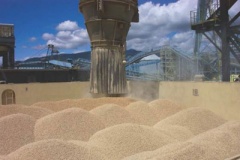Bulk Cargo
| Infobox on Bulk Cargo | |
|---|---|
| Example of Bulk Cargo |  |
| Facts | |
| Origin | - |
| Stowage factor (in m3/t) | - |
| Humidity / moisture | - |
| Ventilation | - |
| Risk factors | - |
Bulk Cargo
Description / Shipment / Storage
Bulk cargo is commodity cargo that is transported unpackaged in large quantities. This cargo is usually dropped or poured, with a spout or shovel bucket, as a liquid or as a mass of relatively small solids (e.g. grain, coal), into a bulk carrier ship's hold, railroad car, or tanker truck/trailer/semi-trailer body. Smaller quantities (still considered "bulk") can be boxed (or drummed) and palletised. Bulk cargo is classified as liquid or dry.
The Baltic Exchange is based in London and provides a range of indices benchmarking the cost of moving bulk commodities, dry and wet, along popular routes around the seas. Some of these indices are also used to settle Freight Futures, known as FFA's. The most famous of the Baltic indices is the Baltic Dry Indices, commonly called the BDI. This is a derived function of the Baltic Capesize index (BCI), Baltic Panamax index (BPI), Baltic Supramax index (BSI) and the Baltic Handysize index (BHSI). The BDI has been used as a bellwether for the global economy as it can be interpreted as an indicator of an increase or decrease in the amount of raw commodities countries are importing/exporting.
Dry bulk cargo
- Coal
- Grain (wheat, maize, rice, barley, oats, rye, sorghum, soybeans, etc.)
- Iron (ferrous & non-ferrous ores, ferroalloys, Pig Iron, scrap metal, pelletized taconite), etc.)
- Bauxite
- Wood chips
- Cement
- Chemicals (fertilizer, plastic granules & pellets, resin powder, synthetic fiber, etc.)
- Dry edibles (for animals or humans: alfalfa pellets, Citrus Pellets, livestock feed, flour, peanuts, raw or refined sugar, seeds, starches, etc.)
- Bulk minerals (sand & gravel, copper, limestone, salt, etc.)
Liquid bulk cargo ("wet" trades)
Non edible and dangerous liquids
- Petroleum
- Liquefied natural gas (LNG)
- Gasoline
- Dangerous chemicals
Liquid edibles and non dangerous liquids
- Vegetable oil
- Cooking oil
- Fruit juices
- Milk
- Zinc ash
etc.
Risk factors
Transport guidelines for these products are given in numerous (IMO) publications, regulations, standards, Codes, books, MSDS sheets etc., of which a few are mentioned below.
Dry Bulk Cargo: check the - IMSBC Code, International Maritime Solid Bulk Cargoes Code
Liquid bulk cargo (“wet” trades): check the
- IBC Code, International Code for the Construction and Equipment of Ships Carrying Dangerous Chemicals in Bulk
- Tank Cleaning Guides
- MARPOL
Liquid edibles and non dangerous liquids: check the
- FOSFA documentation and CODEX standards
- The Code of Practice for the Storage and Transport of Edible Fats and Oils in Bulk
- MARPOL
- FEDIOL Code of Practice.
See also Solid Bulk Cargoes and the IMSBC Code pocket guide :
(http://www.lr.org/Images/IMSBC%20Code%20pocket%20guide_final_web_tcm155-247233.pdf)
Other useful websites are:
http://www.bulkcarrierguide.com/
http://bulkcarrierguide.com/cargo-ventilation.html
http://www.ukpandi.com/knowledge/article/liquefaction-the-latest-position-5479/
http://www.lr.org/Images/IMSBC%20Code%20pocket%20guide_final_web_tcm155-247233.pdf











